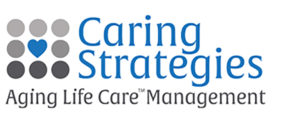News from Caring Strategies
Helpful tips for those who care for elders
October/November 2023
Most people think of physical therapy for recovery from an injury or surgery. What you may not know is that it’s also quite a viable option for relieving many different types of pain. In our middle article we discuss strategies for dealing with perfectionism when it gets out of hand. In our last article, we offer guidance to help you arrange for a meaningful funeral that does not break the bank. The last thing you need is to add financial stress to your already-heavy heart.
Physical therapy and pain relief
Pain is no fun, whether in a knee, a neck, or elsewhere in the body. There are drugs that dull pain. But they don’t cure the problem. Plus, prescription drugs usually have side effects or are addictive. Physical therapy (PT) is a proven treatment that can relieve pain and in some instances, cure the problem. You may think of PT in terms of someone learning to walk after a hip replacement. Or improving their balance after a fall. In fact, PT is a great—and often overlooked—option for addressing pain.
Arthritis. For arthritis, PT focuses on loosening up joints, muscles, and tendons because continued physical activity reduces the pain. Suggestions might also be made for aides such as ergonomic chairs for back or neck pain. Or for back, knees, and hips, a soft cushion mat for standing in the kitchen. Your relative will receive a customized plan tailored to problems in their hands, back, knees, hips, or neck.
Chronic pain. Physical therapists are experts on the musculoskeletal system. If your loved one has chronic back pain, for instance, or other problems with muscle strength or stiffness, they’ll be given exercises to help. Sometimes the focus for pain relief is on flexibility. Other times it’s about building muscular strength.
Headaches. Persistent headaches can be notoriously difficult to cure. A physical therapist will work to define the source and triggers, a pinched nerve, tight jaw, muscle spasm, etc. With an informed plan, PT prevents and relieves headaches by improving posture, neck mobility, and muscle strength.
The body’s natural healing power. The exercises a physical therapist assigns are designed to support the body. They focus on muscle pairs that complement each other, stretching, and contracting. While there may be some soreness from doing unfamiliar moves, there are none of the side effects of medicine. In fact, PT may help your loved one avoid medication altogether. And there’s no potential addiction—except to feeling better! Full benefit does depend on diligence in doing the suggested exercises, however.
Check with your insurance. Medicare will pay for medically necessary PT services. Check with Medicare or your relative’s Medicare Advantage program to learn what is needed. You may be able to find private-pay PT that you can schedule yourself, like a personal trainer.
Return to topCurbing your perfectionism
If you are a perfectionist, you may have noticed that your high standards often backfire. Despite your best intentions, you actually accomplish less. Research confirms this. Studies also show that perfectionism frequently leads to anxiety, depression, and difficult relationships. With a gentler approach, you can still have goals and standards as a family caregiver. And you can have a more enjoyable life, as well as more companionship and support.
Perfectionism is a mental habit.
Also, the “thief of joy.” Try these proven strategies for change:
- Do a reality check. As you strive to accept imperfection be clear about the true risks of a situation. What’s the worst that can happen if you or a family member does something not up to your preferred standard? How likely is it, really, that the worst will occur? What is the more likely outcome? Is it completely unacceptable?
- Challenge your inner critic. The difference between a perfectionist and a healthy high achiever is that the latter is less “black or white” in their approach. Instead, they acknowledge gradations. “This may not be perfect, but it’s plenty good enough.”
- Look for what’s good. For every flaw you find in something you or a sibling does for your relative, stop, think, and acknowledge at least two positives.
- Celebrate small successes. Perfectionists often procrastinate for fear of not doing something well enough. To break the logjam of doubt and inaction, divide tasks into smaller pieces and then recognize each accomplishment.
- You are more than your achievements. Think about who you are, not just what you do. Write down your positive qualities. For instance, that you are “caring,” “honest,” “have a sense of humor.” Make time to be not productive and to just relax. Shift your focus to enjoy being alive and “good enough” versus intensely goal focused and frustrated.
Affordable funerals
When looking for an affordable funeral, there are some guidelines that can help you to make apples-to-apples comparisons. The Federal Trade Commission has made it easier for families to make that comparison with standards that all funeral homes must follow.
For instance, you have the right to price information when you phone. And an itemized price list when you visit. Basic services must be described in the same way: Direct burial, direct cremation, embalming, etc. You can use a casket or urn that is purchased elsewhere. Or an alternative container. (Consider shopping online and having the casket or container shipped.) Embalming is not required if refrigeration is available. Or if the burial is to take place within two days of death.
Separate the public gathering from disposal of the body. There are low- or no-cost places to hold a memorial service or celebration of life: At home, in a park, etc. This provides the option to postpone the service to a date best for everyone concerned.
Closer is not necessarily better. It’s prudent to check out mortuaries in a fair radius around you. If there is a large price difference, a fifteen-minute longer drive may be the wisest choice. (Morticians will generally travel up to twenty to thirty miles to transport the deceased without charging extra.)
Establish a budget before you start calling. Don’t equate the funeral price with the love you feel for your relative. You don’t want to have to contend with debt on top of grief! In fact, an alternative casket made of reinforced cardboard with personalized notes and drawings on it may be more meaningful than a fancy, lined, lead casket.
Visit the short list. Ask a less emotionally involved friend to check out funeral homes with you. An objective perspective will help you buy only what you truly want and can afford.
Return to top



